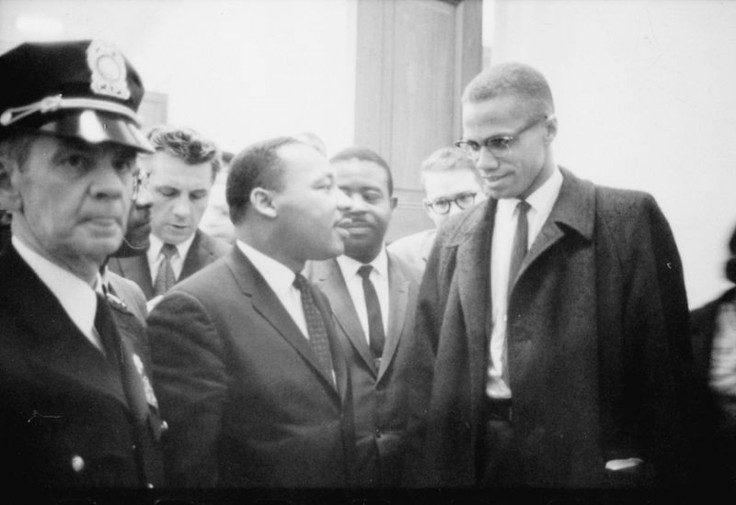Malcolm X and Martin Luther King Should be Remembered as Equals
Opinion

As we remember Dr. Martin Luther King Jr. this frigid January Monday, we should also take the time to commemorate his misunderstood contemporary Malcolm X, whom society refuses to grant the full credit his legacy demands.
While King is remembered each year as a saint sent down from on high to usher in a new era of American equality and civil rights, we should recall his failings, and take a second to learn about the contributions Brother Malcolm also made to racial discourse in 1960s America.
His words may not be as accessible and simple as the I have a dream speech, and he will likely never have a memorial erected in his honor on the National Mall, but Malcolm X is to many Americans as large a figure as King, and one with whom they can more easily identify.
King is the easy civil rights icon, the one packaged for children and for easy reading, the one who has been turned into a symbol of nonviolence and honor.
But as we read if we delve a little deeper, King had his demons as well: From occasional arrogance to infidelity, his was not the perfect preacher's life.
Neither was Malcolm X's, but Brother Malcolm's tale - as told in his inimitable autobiography - follows an arc of redemption that should inspire us to better our own lives.
After his early years as a thug on the streets of Boston's Roxbury slum, where he robbed people, did cocaine, and got himself thrown in jail in the process, he emerged as an unlikely intellectual.
He read and copied down an English dictionary while behind bars, achieving literacy in the process (and so straining his eyes that for the rest of his life he was forced to wear the thick glasses that eventually became his trademark), and began to follow the path of Nation of Islam leader Elijah Muhammad. Muhammad was a compelling figure who helped fill some of the void left behind in Malcolm when his father was killed (some say by a white supremacist group) in 1931.
Malcolm X (given name Malcolm Little) followed Muhammad for years, dropping his white-given last name, rising to a top position in the Nation and following its puritanical dictates: wearing suits and abstaining from drugs, alcohol and pre- or extra-marital sex.
It was during this period that Malcolm began the work of finding his true self, and when he made some of the inflammatory comments that today mark him in many people's uninformed minds as a militant and a racist.
It is the focus on this stage of Malcom X's life that leads many Americans to dismiss him. We revere King as a successor to Mahatma Gandhi, a preacher of both faith and of nonviolence, as infallible in his deeds as in his words, while glossing over Malcolm in middle school history classes as the espouser of "any means necessary," the militant extremist who sought to take what he wanted, and to incite violence.
The only violence that ended up arising from Malcolm's life and words was his own murder. This sacrifice, if nothing else, should give us pause. We should take a day each year to call on our greatest impulses, listen to Malcolm's message, and look beyond his weakest moments.
His were different days. He lived in an era of separate but equal, Jim Crow-style segregation and a time when blacks were in effect denied even the right to vote.
So when Malcolm for a short period flirted with the concept of employing violence in pursuit of what he knew was granted to him by the U.S. Constitution and by his God, he did not act out against the rights of man.
He did not mean to incite anger, he simply said that justice must be attained, and he was exploring how best to go about trying to reach the shining city on a hill King spoke of. We must remember that in those darker days, equality seemed impossible, unreachable, so what comes off as anger and cynicism now, was at that time a desperate cry for fairness.
And in the end, before he was murdered in cold blood, Malcolm did come to join King in advocating nonviolent resistance, denouncing the womanizing, hypocritical Elijah Muhammad and taking off on a pilgrimage to Mecca. It was a period of soul-searching and religious flowering that led him to a state of peace, and which is all-too-often cast aside when we look back at his life.
His speeches and writings live on to remind us of how intelligent Malcolm X truly was. But more importantly, he had the capacity to change. He may not have been born a paragon of what it means to be human and compassionate and wise, but he strove to improve himself until he was able to become just that, and then was shot down before he could spread the message too far.
Malcolm and Martin were both men, and they both had their faults. But they both wanted the same thing - equal rights for all men - and they just took different paths to realizing how to achieve it. And we should remember them both, equally, as the brave pioneers they were and will forever be.
© Copyright IBTimes 2024. All rights reserved.











